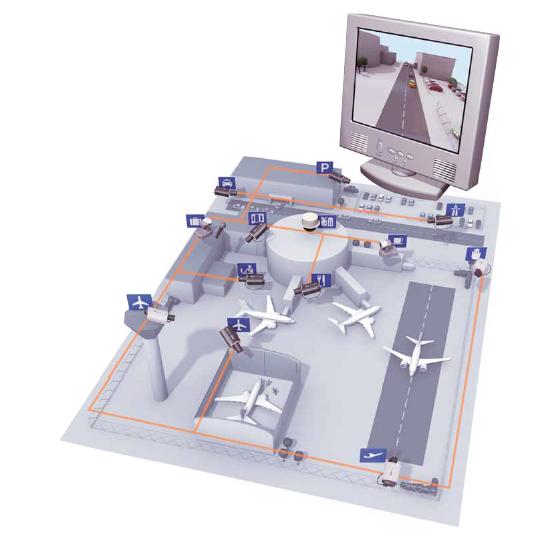 Network
Video Solution
Network
Video Solution
Market Segments - Transportation

One
especially popular application within this segment is the monitoring
of traffic on highways to help commuters plan their journey to
work. Video images broadcast over the Internet provide real-time
traffic information and can reduce congestion. Emergency services
can use the images to handle accidents more efficiently.
Passengers
on public transport can be protected from crime at bus stops and
train stations by security surveillance cameras, as well as on
the bus or train itself. However, due to the fear of terrorist
attacks, the airport has become the key place for employing network
video solutions. Network video can be used in the airport environment
to prevent theft, drug trafficking, illegal immigration, and much
more besides.
The
diagram shows where cameras might be placed, and the different
purposes they serve.
Entrances
and Exits
Cameras placed at the entrances and exits to an airport terminal
record who comes in and out 24 hours per day. This deters criminals
and the footage can be used as evidence if a crime occurs.
Customs
Reinforcing the work of on-the-spot security staff, cameras at
customs areas enable remote monitoring for e.g. illegal immigration
and smuggling.
Car Parks
Cameras employed here ensure the safety of people using the car
parks, and ensure their cars are not subject to theft or vandalism
during the owners' absence.
Hangers
Airplanes in their hangers can be monitored remotely to ensure
that they are not tampered with between flights.
Catering
At a busy airport, air plane catering requires split second timing.
Network cameras can be used by caterers to see when the plane
is ready to discharge its last flight's meal service and receive
its next one.
Baggage Reclaim Area
Network video can be employed through out the airport's baggage
system. At the customer interface it can be used to prevent crime,
whilst behind the scenes, cameras can help airport staff check
that the system operates smoothly.
Broadcasting at Airports
Network cameras can improve efficiency and customer service, by
broadcasting up-to-the-minute images of incoming airplanes in
the departure lounge that show, for example, when a plane is ready
to board.


